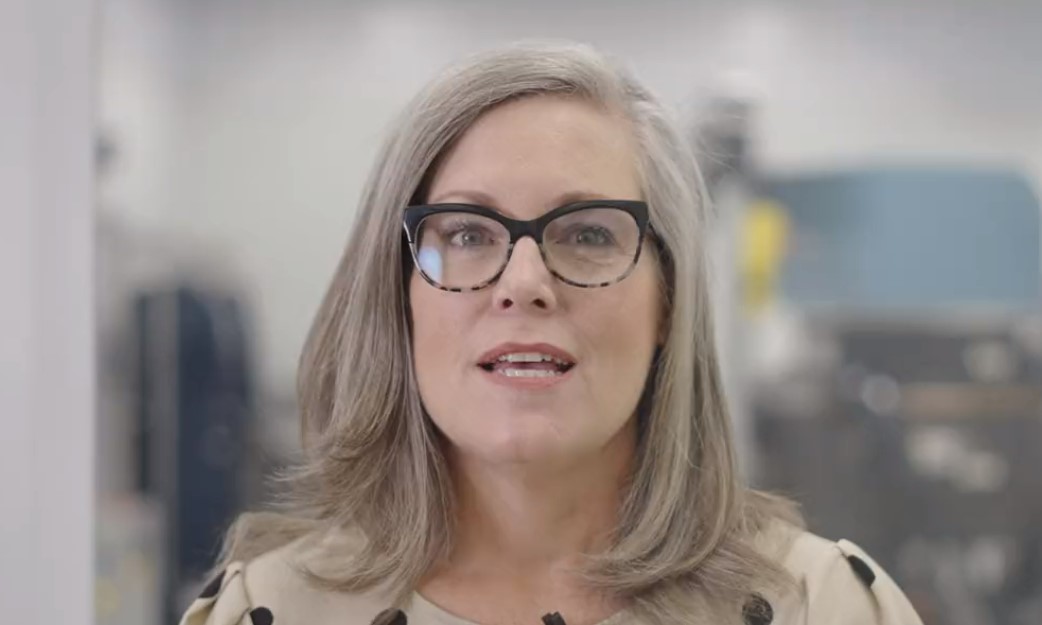
by Ethan Faverino | Jan 30, 2026 | News
By Ethan Faverino |
Former Arizona State Representative Noel Campbell, a dedicated public servant and veteran, passed away on January 24, 2026, at the age of 84, from injuries sustained in a motorcycle accident on I-10 in Phoenix on January 20.
Arizona House Speaker Steve Montenegro announced the news, highlighting Campbell’s lifelong commitment to service. “Noel Campbell lived a life defined by service,” explained Montenegro. “He served his country in uniform, protected our communities in the air and on the ground, and brought that same sense of duty to the Arizona House. Our state is better because he chose to serve. Our prayers are with Noel’s wife, Mary Beth, his family, and all who were fortunate to know him. He will be remembered with respect and gratitude.”
Campbell, a Republican from Prescott, represented Legislative District 1 in the Arizona House of Representatives for three terms, from 2015 to 2021.
He chaired the House Transportation Committee during the 53rd and 54th Legislatures, earning respect for his practical approach, leadership, and thoughtful policy work.
Before entering politics, Campbell’s career was marked by extensive service in high-stakes roles. He served as a United States Navy combat aviator during the Vietnam War, later retiring as a Commander in the Naval Reserves.
He went on to work as a pilot with the United States Customs Service, combating illegal drug trafficking, and later as a wildfire pilot for the United States Forest Service.
Arizona lawmakers from both chambers mourned his loss and celebrated his legacy. “Noel served Arizona with distinction, representing his district with a steady hand and a deep commitment to the people he was elected to serve,” expressed Senator Mark Finchem. “Never afraid to have a scrappy debate, his work at the Legislature reflected a strong belief in public service, civic duty, and the responsibility of government to its citizens. Noel was someone who took the job seriously and never forgot who he worked for. He represented his district, Legislative District 1, with integrity and left a lasting mark on Arizona’s legislative history.”
“His passing is a loss for our state,” Senator Finchem added. “Noel was known for his thoughtful approach to policy and his dedication to Arizona communities, particularly in Legislative District 1. His service spanned decades of civic involvement, and his impact continues to be felt by colleagues and constituents alike.”
Representatives Quang Nguyen and Selina Bliss also honored Campbell’s legacy in Arizona, stating:
“Noel was a mentor and a friend,” Rep. Nguyen said. “When I was first elected, he reminded me that my vote mattered just as much as anyone else’s and that no one should ever be bullied out of doing what they believe is right. He also taught me that your word is everything. Once you lose that, you have nothing left. I am grateful for his guidance and his example. Thank you for your service, Representative Campbell. Rest in peace.”
“Noel Campbell was a champion for Legislative District 1 and for the state of Arizona,” said Rep Bliss. “He served with honor and cared deeply about the people he represented. God bless him, and rest in peace.”
Campbell’s decades of service—from military aviation and federal law enforcement to wildfire response and state legislation—reflected a consistent willingness to step forward in challenging environments, guided by leadership, discipline, and a focus on protecting communities in his district and across the state of Arizona.
Ethan Faverino is a reporter for AZ Free News. You can send him news tips using this link.

by Ethan Faverino | Jan 29, 2026 | News
By Ethan Faverino |
Arizona Senator Carine Werner (R-LD4) renewed her demand for transparency and accountability within the Arizona Health Care Cost Containment System (AHCCCS) before the committee’s latest special oversight hearing on Thursday, January 29th.
Following months of intense investigation—including multiple hearings, extensive document requests, and sworn testimony—the committee has uncovered persistent systemic failures at AHCCCS that continue to undermine Arizona’s provider network and block vulnerable patients from accessing essential care.
Providers remain unable to fully participate in the system, with critical services constrained and families in crisis struggling to access timely and appropriate care. “This is no longer just a policy failure. It’s a public health and safety crisis,” stated Senator Werner. “Decisions made inside AHCCCS dismantled parts of our provider network and robbed Arizonans of the care they desperately need. Leadership appearing before the committee has repeatedly failed to provide clear, complete answers regarding enforcement decisions, provider terminations, and the internal actions taken after billions of dollars in Medicaid fraud were uncovered.”
During the current legislative session, Werner has introduced several bills to improve oversight, reinforce accountability, and require AHCCCS and the Arizona Department of Health Services to fulfill their obligations to patients, legitimate providers, and Arizona taxpayers.
While expressing cautious optimism regarding the leadership of the newly appointed AHCCCS director, Senator Werner emphasized that personnel changes alone are insufficient to resolve the deep-rooted issues uncovered by the committee’s ongoing investigation.
“The committee remains cautiously optimistic that newly appointed Director Ginny Rountree can begin stabilizing the agency, but the oversight record makes clear that leadership changes alone will not resolve the systemic breakdown exposed through the investigation,” explained Werner. “The Senate Health & Human Services Committee will continue its work until access to care is restored, trust is rebuilt, and meaningful accountability is achieved within Arizona’s Medicaid system.”
Ethan Faverino is a reporter for AZ Free News. You can send him news tips using this link.

by Ethan Faverino | Jan 28, 2026 | Economy, News
By Ethan Faverino |
Arizona State Representative Chris Lopez (R-LD16) introduced House Bill 2826, which would exempt materials such as concrete, used in the improvement and maintenance of agricultural irrigation canals, from Arizona’s transaction privilege tax on prime contracting.
The “No Tax on Concrete” bill aims to reduce costs for farmers, strengthen water conservation efforts, support food affordability, and boost irrigation efficiency by conserving water resources critical to Arizona’s agricultural sector as the state faces ongoing water security challenges.
Specifically, HB 2826 would establish a targeted exemption under the prime contracting classification in ARS § 42-5075 for materials and supplies used to improve and maintain ditches, irrigation lines, and canals on agricultural lands.
Concrete-lined canals offer significant benefits over traditional unlined earthen canals. Unlined systems can lose 30%-50% or more of conveyed water volume to seepage into permeable soils.
By contrast, concrete lining reduces these losses dramatically, increases flow velocity, minimizes erosion and weed growth, and lowers long-term maintenance needs. Such projects can save thousands of acre-feet of water annually, providing a highly cost-effective approach to water conservation.
Projects funded by the Water Infrastructure Finance Authority of Arizona (WIFA) and awarded to irrigation districts—Buckeye Water Conservation & Drainage District, San Carlos Irrigation & Drainage District, and Roosevelt Irrigation District—are anticipated to conserve between 135,000 and 368,864 acre-feet over their lifetimes, at only an estimated cost of $2 to $3 per acre-foot.
“The House Republican Majority Plan is focused on affordability, and that starts with food on the table and the cost of water to produce that food,” stated Rep. Lopez. “Converting dirt canals to concrete-lined canals saves thousands of gallons of water, which reduces pumping costs, energy, and other expenses that go into the price of food. Eliminating the tax on concrete and other contracting costs to convert these canals to concrete lining not only helps to reduce the costs even further but also helps to conserve water at a time when water conservation has never been more critical for our state.”
Ethan Faverino is a reporter for AZ Free News. You can send him news tips using this link.

by Ethan Faverino | Jan 27, 2026 | News
By Ethan Faverino |
State Representative Quang Nguyen (R-LD1) has introduced House Bill 2763, legislation designed to prevent the closure of Arizona’s public shooting ranges without thorough public review and legislative consideration.
The bill amends ARS § 17-621 to add a critical new requirement: No qualifying state-owned shooting range may be closed unless the Arizona Legislature adopts a joint resolution approving the closure.
This measure builds on the existing safeguards in the statute, which already mandate several steps before the Arizona Game and Fish Commission can close such a facility.
Under current law and the proposed amendments, closure of a state-owned shooting range located within or adjacent to a city with a population exceeding one million (such as those around Phoenix) would require all of the following:
1. A written recommendation from the Director of the Arizona Game and Fish Department.
2. A detailed report from the Commission explaining the basis for the recommendation.
3. Unanimous approval by the Commission following public hearings in the three counties with the highest population.
4. Review of the recommendation by the Joint Committee on capital review.
5. Adoption of a joint resolution by the Legislature approving the closure.
6. Approval of the closure by the Governor via executive order.
HB 2763 specifically inserts the legislative joint resolution step (as item 5 in the amended list) to ensure that decisions affecting statewide public assets receive full oversight from elected representatives.
Arizona is home to ten public shooting facilities owned by the Arizona Game and Fish Commission, which serve as critical, state-managed venues for firearm safety training and recreational shooting.
“Public shooting ranges that belong to the people of Arizona should not be shut down by administrative fiat or behind closed doors,” emphasized Representative Nguyen. “If a statewide asset is going to be closed, that decision should be made in public, with full legislative approval.”
The legislation holds particular significance for the Ben Avery Shooting Facility in north Phoenix – the largest publicly operated shooting facility in the United States. Operated by the Arizona Game and Fish Department, Ben Avery serves tens of thousands of Arizonans annually through law enforcement qualifications, firearm safety training, hunter education, and competitive shooting events.
The range predates much of the surrounding urban development and was established to promote safe and regulated shooting activities.
“Ben Avery was built to promote safety,” Nguyen stated. “If this range were ever closed, shooting wouldn’t stop. It would be pushed into unregulated desert areas, creating serious public safety risks and environmental damage. That outcome helps no one.”
Ethan Faverino is a reporter for AZ Free News. You can send him news tips using this link.

by Ethan Faverino | Jan 26, 2026 | News
By Ethan Faverino |
Arizona Governor Katie Hobbs recently released her executive budget proposal for the 2026-2027 fiscal year, totaling $17.7 billion in general funding expenditures. The plan represents a $100 million increase over the $17.6 billion budget approval by the Arizona Legislature for the prior year. According to Glenn Farley, Research and Policy Director at Common Sense Institute Arizona (CSI), the proposal extends a pattern of substantial growth in state spending observed in recent years.
In a recent article, Farley told The Center Square, “This budget continues the trend of massive increases, really historically unprecedented increases in the state’s Medicaid-funded disability program run out of the Department of Economic Security (DES).”
Farley highlighted that the most significant expansions in the proposal stem from Arizona’s Medicaid program, K-12 education, and other health care-related initiatives.
A standout element is the marked growth in the state’s Medicaid-funded disability services program operated by DES, which supports home-based care for Arizonans with disabilities. Farley described these increases as “historically unprecedented,” noting a shift where the largest caseload surge now occurs in the DES disability program rather than traditional drivers like the Arizona Department of Education.
The budget addresses the needs of approximately 62,000 qualified Arizonans by expanding access to home-based services through adjusted subsidy structures for home-based providers. For FY26, the proposal allocates an additional $128.1 million from the general fund to DES, supplemented by $271.9 million in the Department Long Term Care System Fund (DLTCSF).
In FY27, ongoing funding increases include $298.8 million from the general fund and $673 million in the DLTCSF.
Farley noted that Governor Hobbs’ budgets have frequently relied on one-time funding sources rather than sustainable ongoing commitments, a pattern that limits long-term fiscal stability.
At the same time, the proposal conforms to recent federal adjustments under HR 1, which aim to restrain cost growth in Medicaid and SNAP by shifting greater responsibilities onto states.
While this alignment addresses federal requirements, it adds operational complexity without resolving underlying sustainability concerns in Arizona’s expanding health and disability services.
In contrast to the administration’s spending approach, Arizona Republicans introduced a tax relief plan earlier this year, projected to save Arizonans $1.1 billion over the next three years, which Governor Hobbs vetoed.
Farley, who served eight years under the prior administration, observed that budget finalization timelines have shifted under Hobbs from the typical time of March or April to May or June.
He further noted an unusually high volume of significant tax code changes this year, driven by federal updates to adjusted gross income calculations, including the addition of new deductions and exceptions.
Ethan Faverino is a reporter for AZ Free News. You can send him news tips using this link.





